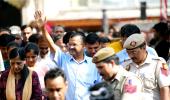The Central Bureau of Investigation (CBI) on Friday defended in the Supreme Court the arrest of Delhi Chief Minister Arvind Kejriwal, saying it was necessary as he chose to remain evasive and non-cooperative in his replies to questions about his role in the alleged excise policy scam.

In its detailed affidavit filed in response to Kejriwal's plea challenging his arrest by the central agency, the CBI alleged all critical decisions in the formulation of the now- scrapped excise policy were taken at his behest with the connivance of the then deputy chief minister Manish Sisodia.
Claiming that Kejriwal was attempting to 'politically sensationalise' the case, the CBI said he was involved in the criminal conspiracy in the formulation and implementation of the excise policy, and his arrest on June 26 was necessary for a just conclusion of the probe as he was 'purposely derailing' the investigation.
'The necessity to arrest also arose based on the materials on record and since the petitioner chose to remain evasive and non-cooperative during his examination on June 25,' the affidavit said.
The CBI's affidavit was taken on record by a bench of Justices Surya Kant and Ujjal Bhuyan, which posted the matter for further hearing on September 5.
'It is most respectfully submitted that the influence and clout of the petitioner is evident, and he commands influence not only over the Government of GNCT of Delhi being the Chief Minister, but also over any or all relevant decisions, activities concerning the Aam Aadmi Party, being its supremo and national convenor. He enjoys a close nexus with the officials and bureaucrats,' the agency said.
It added Kejriwal has also been confronted with sensitive documents and statements of witnesses during his custodial interrogation, and having such knowledge, he is likely to influence the witnesses.
The federal probe agency said Kejriwal was not entitled to parity with the other co-accused considering his role in the criminal conspiracy in the formulation and implementation of the Delhi Excise Policy 2021-22, more specifically when any or all decisions of the government and the party were taken only as per his directions.
'Even otherwise, bail granted to co-accused has no bearing on a petition challenging the legality of the arrest of the petitioner,' it said, adding that Kejriwal's release on bail will "gravely prejudice" the trial of the case, which is at an initial stage and key witnesses are yet to depose.
It said the July 12 order granting interim bail to Kejriwal in an excise policy case related to alleged money laundering has no bearing on the CBI's case in which he stands accused of corruption.
'As far as the averments regarding interim bail on medical grounds is concerned, it is humbly submitted that regarding the ailments, the treatment can be provided at the Tihar Jail hospital or any of its referral hospital as per jail rules & manuals, which is being already done. No case has been made out by the Petitioner to be released on medical bail, which ought to be granted only if the treatment is not possible in the jail,' it said.
The CBI said though Kejriwal does not hold any ministerial position, it has emerged over a period of time that all critical decisions in the formulation of the now scrapped excise policy were taken at his behest with the connivance of the then deputy chief minister Manish Sisodia, who held the excise portfolio.
'The petitioner was initially asked to join the investigation under section 160 CrPC being understood as one of the persons acquainted with the facts of the case. However, there was certain material which pointed a needle of suspicion towards him. As the investigation progressed, it started becoming clear that the petitioner (Kejriwal) has a pivotal role in the formulation of the new excise policy,' it said.
The CBI said to proceed against the chief minister and to investigate him, permission under section 17-A of the Prevention of Corruption Act was sought from the competent authority and was obtained on April 23.
'To summarise, the petitioner has been involved in the criminal conspiracy in the formulation and implementation of the Delhi Excise Policy 2021-22, more specifically when any or all decisions of the government and the party were taken only as per his directions. He already had the preconceived idea of the privatisation of the excise policy,' it said.
The probe agency alleged that Kejriwal, with the connivance of other accused, 'deliberately' caused the tweaking and 'manipulation' in the excise policy and got enhanced the profit margin of wholesalers from 5 per cent to 12 per cent without any rationale, causing 'undue windfall gains' to the wholesalers in return for an illegal gratification of Rs 100 crore from the 'South Group' to meet the election related expenses of Aam Aadmi Party in Goa.
It claimed during his interrogation in Tihar Jail on June 25, the AAP leader had failed to give satisfactory replies to queries regarding his role in demanding Rs 100 crore from the 'South Group', which the agency has claimed is a cartel of businessmen and politicians.
'He further gave evasive replies regarding his role and the role of other co-accused in respect of criminal conspiracy hatched. His replies were contrary to the oral and documentary evidence gathered by CBI during the investigation and he failed to disclose the facts truthfully, despite being confronted with the incriminating evidence,' it added.
The excise policy was scrapped in 2022 after the Delhi lieutenant governor ordered a CBI probe into alleged irregularities and corruption involving its formulation and execution.











 © 2025
© 2025